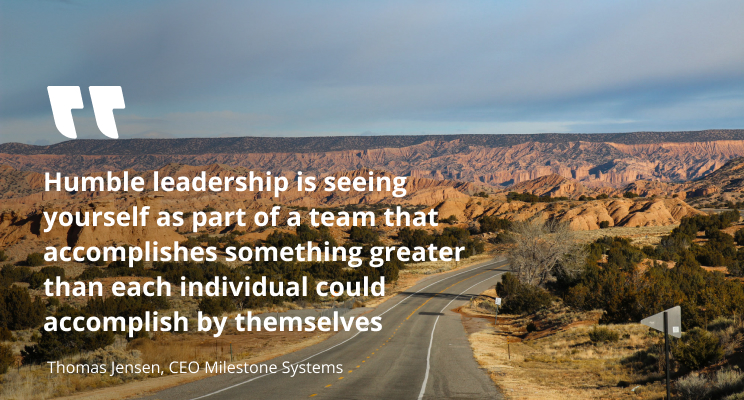Why Leadership is about People

By Thomas Jensen, CEO, Milestone Systems
On the first Friday in March each year we celebrate the Employee Appreciation Day. Which is, as I mentioned in my post on March 5, a day dedicated to focus our attention on our colleagues and recognize their achievement and contributions.
In my mind, what this special day represents is strongly rooted in Milestone’s culture and is very much connected to why I decided to join the company. As I’ve said on various occasions already, Milestone’s clear People First approach played a crucial role in my decision to take on the job as CEO. I was intrigued by joining a company that understands how to put people alongside performance numbers and recognizes that its achievements are, one way or another, driven by people. I saw Milestone as a company that truly lives my leadership philosophy that, no matter which industry you are in, you don’t do business without people.
But what is leadership? And how do we make sure that our colleagues feel appreciated on a daily basis, not only on this one specific Friday each year?
In my mind, the answer is leadership. Which we shouldn’t mix with the old-school, top-down idea of management. Yes, when running a business, you sometimes have to make difficult, top-down managerial decisions. But in my view, this should only be a part of the role rather than your core function. As a leader your job is to be inclusive, approachable, willing to ask questions to get input and most important, listen to the answers that you get. The more informed, the more diverse perspectives your colleagues can give you, the better suited you’ll be to support the right decisions for your business.
To do this well, you have to be able to adapt your style and approach to what is needed at a given point in time. And that is the most significant difference between management and leadership. Management is about setting a direction and organizing how to do it – and in the old-fashioned version, telling people what to do and how to do it! Leadership on the other hand is a more of a humble approach. Leadership is about visualizing that direction and helping people follow the path that goes in that direction. This can be a combination of many different factors, for example, if you are lost, leadership can be telling you how to get back on the path.
In my view, humble leadership is seeing yourself as part of a team that accomplishes something greater than everyone could accomplish by themselves. That is why I talk about colleagues not employees. As colleagues, we mean something to each other, and we watch out for each other; as employees we are just tools to achieve a task. Moreover, it is deeply founded in my core belief that every single colleague creates value for the company – no single role is more important than another as the entire system will break or malfunction without all roles. In modern-day businesses, no company can survive successfully with unnecessary roles in the various teams.
This approach to leadership builds followership and drives loyalty, without followership, there is no leadership. Companies that are able to nurture a culture like this don’t just produce results or products, instead, they give their customers something they understand and see as valuable, and that drives revenue.
In these companies, leaders understand that their job is to champion the culture, to make sure that everyone has a voice, function, and a purpose. To make this work, humble leaders ensure that all of their colleagues feel important to the company and its business.
I hope you agree with me that Milestone is one of “these” companies I have been describing. Our approach to leadership is to act as coaches providing support, tying the knots, and ensuring that everyone at Milestone has the right foundation and strategic direction to continue our success. Do we have to make difficult decisions? Yes, of course, but this is just one function of the role as a leader.
As I see it, when you’re a leader — no matter how long you’ve been in your position — your job is to bring out the best in your colleagues. The way I do this is to help people feel purposeful, motivated, and energized so they can bring their best selves to work.
I understand that maybe not everyone sees things the way I do, but I ask you to look at the outcome we are trying to achieve. Humble leadership drives loyalty, increases effort and retention, generating better service, happier customers, and increased revenues. At the end of the day, isn’t that simply good business?

